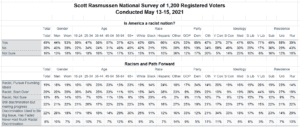Ninety-three percent (93%) of voters nationwide recognize that racism has played a major role in America’s history. A Scott Rasmussen national survey found that total includes 49% who say America is a racist nation; 22% who believe there is still too much racial discrimination, but we’re making a lot of progress; and 22% who believe racial discrimination used to be a big issue, but it’s pretty much faded away.
The survey also found, however, that just 20% believe we should recognize that America was founded on racism and start over with something new.
Three times as many (63%) see racism as an issue, but aren’t ready to remake our political system. That includes 44% who believe it’s a declining part of our history and 19% who believe America is racist but the best path forward is helping the nation live up to its founding ideals.
Ten percent (10%) believe America is a racist nation but aren’t sure what to do about it. Eight percent (8%) believe America never had a significant amount of racial discrimination
Among those who do not describe the nation as racist, the overwhelming majority (84%) recognize that racial discrimination has played a significant role in American history. That includes 42% who believe there is still too much racial discrimination, but we’re making a lot of progress and 42% who believe racial discrimination used to be a big issue, but it’s pretty much faded away.
An earlier survey found that 8% of voters nationwide say most of their friends are racist. At the other end of the spectrum, a plurality (46%) of voters say none of their friends are racist. That total includes 59% of Republicans, 44% of Independents, and 35% of Democrats.
Thirty-eight percent (38%) of Hispanic voters and 34% and Black voters (34%) say we should recognize that America was founded on racism and start over with something new. In both cases, however, a larger number reject the idea of remaking our political system. Fifty-two percent (52%) of Hispanic voters reject the idea of remaking our political system. So do 42% of Black voters.
Among Very Liberal voters, who are evenly divided: 44% want to start over with something new while 46% reject that idea.
While racial and ethnic demographics are important to consider, it’s also important to recognize that our society is not neatly divided into easy to define racial categories. Richard Alba, a Distinguished Professor of Sociology at the Graduate Center, City University of New York, has pointed out “a robust development that is largely unheralded: a surge in the number of young Americans who come from mixed majority-minority families.” They “have one white parent and one nonwhite or Hispanic parent.”
Alba lays out his case in an important new book: “The Great Demographic Illusion: Majority, Minority, and the Expanding American Mainstream.”
A recent Scott Rasmussen survey found that 17% of voters claim at least two racial and ethnic backgrounds in their family history. It’s also significant to note that Hispanic voters whose parents were born in the United States have views that are much different than Hispanic voters who were born elsewhere.
The complexity of America’s racial and ethnic heritage suggests that the story of America is a nation with an expanding and ever more inclusive mainstream. That mainstream is guided by a shared desire to have the United States draw closer to living out its founding ideals of freedom, equality and self-governance.
SIGN UP to receive Scott’s free email newsletter.
CHECK OUT Scott’s latest polls.
Note: Neither Scott Rasmussen, ScottRasmussen.com, nor RMG Research, Inc. have any affiliation with Rasmussen Reports. While Scott Rasmussen founded that firm, he left more than seven years ago and has had no involvement since that time.
Methodology
The online survey of 1,000 Registered Voters was conducted by Scott Rasmussen from May 13-15, 2021. Field work for the survey was conducted by RMG Research, Inc. Respondents were selected from a list of Registered Voters and through a process of Random Digital Engagement. Certain quotas were applied, and the sample was lightly weighted by geography, gender, age, race, education, internet usage, and political party to reasonably reflect the nation’s population of Registered Voters. Other variables were reviewed to ensure that the final sample is representative of that population.



